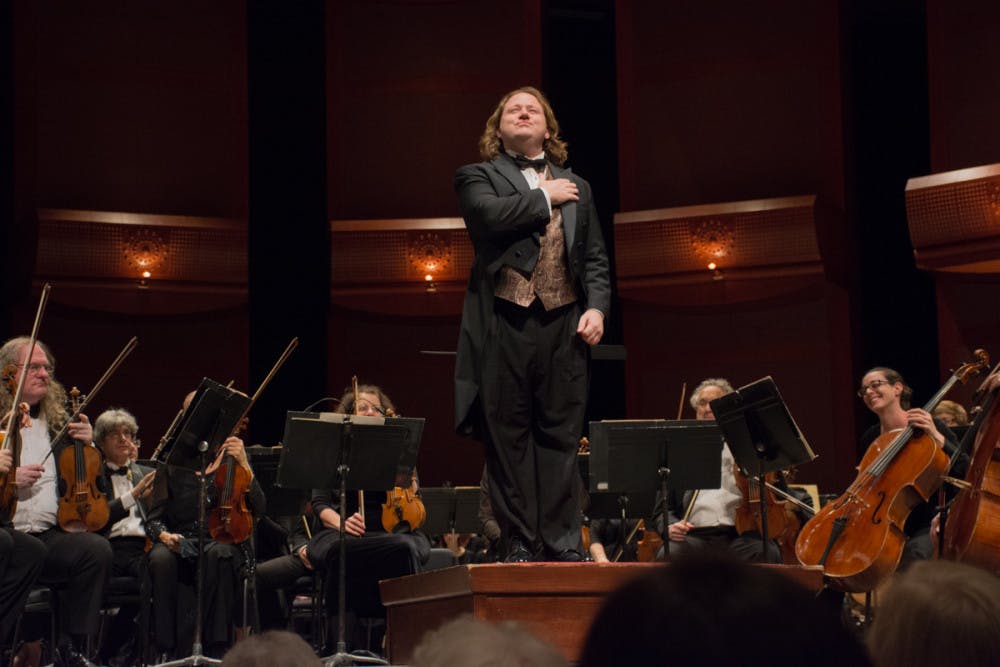Seton Hall’s Prayer for Peace concert on Oct. 27 at the New Jersey Performing Arts Center (NJPAC) was not only held to bring current Seton Hall students together but it was also intended to facilitate a welcoming environment for refugee students at the University.
The concert, which featured Peteris Vasks’ “Dona Nobis Pacem,” Moshe Knoll’s “Psalm 133,” and “A Survivor from Warsaw” by Arnold Schönberg paired with Beethoven’s Ninth Symphony, was meant to show refugees in attendance that Seton Hall is a home for all, according to Dr. Andrea Bartoli, dean of the School of Diplomacy and International Relations.
[caption id="attachment_20502" align="aligncenter" width="838"] “Music has the ability to unite and inspire,” Jason Tramm, a SHU professor and concert conductor, said.
“Music has the ability to unite and inspire,” Jason Tramm, a SHU professor and concert conductor, said.
Sarah Yenesel/Asst. Photography Editor[/caption]
Bartoli said that refugee students should know that they will be treated like any other Seton Hall student, and that the school will also help them financially in order to attend as it would with any other student. This is the scholarship initiative that the Prayer for Peace concert is working to advance.
The School of Diplomacy and International Relations and the College of Communication and the Arts worked in conjunction to spread this message through the concert.
Bartoli explained why the two schools decided to collaborate.
“Music harmonizes dissonances that highlight the importance of harmony and diplomacy seeks what unites,” he said.
Bartoli also said what he hopes to accomplish in regards to the scholarship initiative.
“This scholarship initiative is a way to strengthen the community at Seton Hall,” Bartoli said. “The goal is to have refugee students feel welcomed enough to enroll Seton Hall. It is meant to help people to be able to turn their lives around, which is very much in sync with what Seton Hall is all about.”
Bartoli shared what the concert meant to him.
“The concert will invite each of us to appreciate the power of one voice in bringing peace about.”
Jason Tramm, assistant professor and director of choral activities and conductor of the concert, shared his thoughts about the power of music.
“I noticed that every time I was in another country conducting, as soon as I put the baton down, I may not even speak the same language, but everyone found a common purpose,” Tramm said. “The language barriers fell away and the social barriers fell away, and [the audience and the performers] immediately understood each other.”
Tramm said that music is all about the connection he feels with the audience while conducting.
“Music has the ability to unite and inspire,” he said. “Music also has the ability to cross the cultural boundaries and to reach out to people that are different and to make human connections. That’s one thing that beauty and art do: bring people together.”
The power of music, Tramm hopes, will inspire refugees to attend the University.
Deidre Yates, dean of the College of Communication and the Arts, said she hoped the concert showed that the power of one voice can bring about change and hope. She also said that the College of Communication and the Arts is proud to be a contributing sponsor.
Allegra Berg, a junior diplomacy and international relations major, offered her sentiments on the concert prior to performing.
“I hope that those who attend the concert will be drawn together,” she said. “Music has a powerful way of bringing people together and helping to create peace. I hope that this concert will help with that and bring about people from all over, no matter their race, religion, gender, or political view to share a common love.”
She said that she hopes the concert will inspire refugees to attend Seton Hall.
“I hope that after seeing this, [refugees] will know that Seton Hall is open and a safe place for them,” she said. “They are wanted here and they are welcome.”
Jordan Green, a sophomore music and theatre major, said that the program is vital in showing that Seton Hall is in support of helping refugees advance in life.
“The refugee program is really important because it shows that Seton Hall will fight for peace and that the school wants to give educational opportunities to those who need it most,” Green said.
Isabel Soisson can be reached at isabel.soisson@student.shu.edu.

Comments




